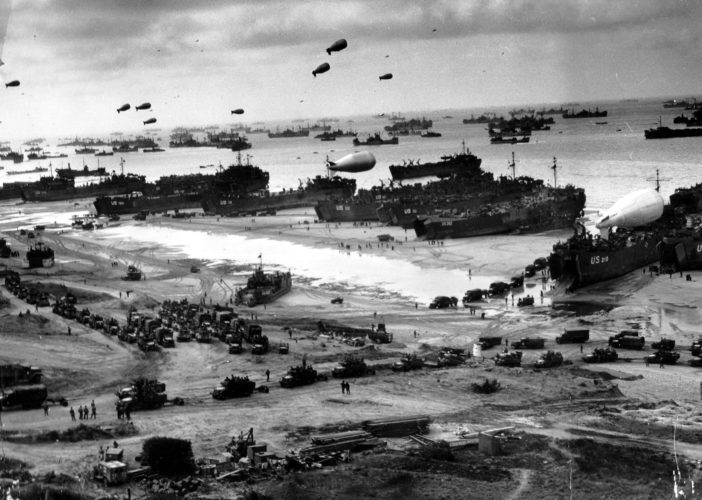By Steve Price
Eighty years ago, the brave men of the Allied Expeditionary Force landed on the beaches of northern France in what was to be the greatest amphibious landing in military history. It was called Operation Overlord, and it would prove key to loosing the bonds of Europe from the grip of the Nazis in World War II. Today, most of the brave men that went ashore on Gold, Juno, Omaha, Sword and Utah Beaches are no longer with us; some 4,000 men died in the landings alone. But on this, the eightieth anniversary of one of the greatest military operations in human history, we pay homage to the brave soldiers that helped to liberate Europe and bring about an end to the deadliest conflict in human history. More than learning about what they did and how they did it, we want to postulate a world where Hitler’s criminal regime remained unchallenged in the west.
This is one possible scenario:
Imagine it is the year 1944, and Operation Overlord has been met with strategic and tactical failure. Adolf Hitler declares victory over Europe and strengthens his hold over the continent. Continued Nazi subjugation would exist at least for another year, perhaps two in most of the continent, including places like Belgium, France, Norway, and Greece. The push from the south through Italy might have forestalled or may have even been pushed back with the arrival of fresh troops from the north of the continent. The continued horrors of the Holocaust would have continued unabated in the west of Europe for an interminable period. And then, things would get decidedly worse for the continent as the Red Army would push west into Germany and conquer not only the eastern section of the country and Berlin, but the whole of the country, possibly even extending tendrils into France. The horrors of Nazism would be replaced by the horrors of Soviet Communism, bringing the continent to heel and forcing the United Kingdom and the United States to become more insular in their politics.
The outcome of the Cold War could have been a dramatically different development in world history if Overlord fails.
Of course, this prognostication comes with a certain understanding that variables would have made things hazy to predict. If Overlord failed, the Western Allies may have attempted a second or even a third invasion, if for no other reason than to liberate parts of Europe before the Soviets could. The conflicts of World War II could have bled into the Cold War itself, only this time engulfing western Germany and France instead of eastern Germany and the new Soviet bloc. The fate of world history could be inextricably altered, and not necessarily for the better.
Such is the debt that we owe the young men that went ashore that balmy, overcast June day in 1944 on the beaches of Normandy. They not only prevented Hitler’s regime from continuing to run roughshod over the continent, but they also averted an even bigger conflict to come with the Soviet Union in the years after the war’s conclusion. The prospects of a Cold War in the Atlantic instead of across the heart of Europe are almost too great to contemplate, to say nothing of allowing Nazi atrocities to continue onward for longer in this alternate hellscape than what actually occurred in reality.
Understanding these stakes puts an even greater emphasis on the heroism of the men that went ashore that day in June 1944. D-Day (not a code name for dooms-day as is popularly thought) marks the end of the high watermark of Nazism in Europe. It is the settling accounts from 1939 when the war began and the world was thrust into a tempest from which it would take years to recover. In some respects, the wounds of World War II have still not recovered, given the divisions of Europe that occurred as its direct consequence and the existence of the continent today. American, British, Canadian, no matter the nationality of the man that went ashore, their honor and courage are testaments to the spirit of free men that worked to defeat the greatest criminal regime of modern times.
What is more, the success of the D-Day landings marked a turning point in the fortunes of the United States and its allies as well. Not only in the sense that military victory in Europe was now achievable through their toehold on the continent, but in their belief in the righteousness of their cause and the purpose to which they had been called. Western civilization is not just a geographic concentration of nations, it is an idea in democracy, civil liberties, the right of self-determination and freedom. Sometimes those values come under assault, but when the chips are down we revert to form and remember the ideals that define us. Such is the victory that was begun in Normandy in June 1944, when the world teetered on the brink of totalitarianism winning over the future and snuffing out the light of liberty on the continent.
Now, the Greatest Generation of the West is slowly fading out of existence, lost to time immemorial. There are fewer and fewer survivors of that famous assault left each day, with the entire generation expected to be gone in less than two decades. If you know a veteran of the Second World War, or of D-Day even, make sure to thank them this June for their service in defense of humanity. Thank them every time you see them, for your liberties are the handiwork of the people of their generation, who defended against monstrous ideologies and monstrous ideas.



